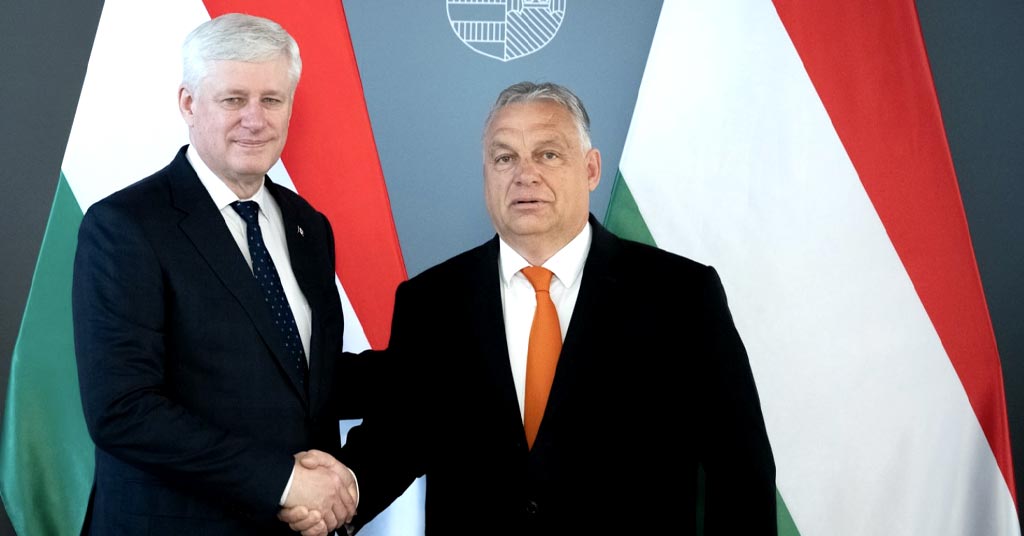
Stephen Harper Vows to ‘Strengthen’ Ties Between Conservatives and Hungary’s Far-right, Authoritarian Government
Hungarian Prime Minister Viktor Orbán praises Harper as a ‘great ally’
Former Canadian Prime Minister Stephen Harper is forging closer ties between a global alliance of conservative parties and Hungary’s far-right, authoritarian leader Viktor Orbán.
On Thursday, Harper and Orbán tweeted photos of the two leaders at a meeting in Budapest.
Harper, who now serves as Chairman of the International Democratic Union, tweeted that he and Orbán discussed the “importance of centre-right parties strengthening their collaboration.”
As @IDUalliance Chairman I was pleased to meet with Fidesz Party Leader @PM_ViktorOrban today in Budapest. We discussed the IDU’s strong support for Ukraine and the importance of centre-right parties strengthening their collaboration. pic.twitter.com/dPU1Q7Oi5r
— Stephen Harper (@stephenharper) July 6, 2023
Orbán tweeted his own statement thanking Harper for a “great meeting,” adding that “international cooperation between right-wing, conservative parties is more important than ever.”
“Chairman Harper is a great ally in this respect. Thank you for your support, Mr. Chairman!”
Had a great meeting today with @IDUAlliance Chairman @stephenharper . International cooperation between right-wing, conservative parties is more important than ever. Chairman Harper is a great ally in this respect. Thank you for your support, Mr. Chairman! pic.twitter.com/2R3B75w1Qt
— Orbán Viktor (@PM_ViktorOrban) July 6, 2023
Since his defeat in Canada’s 2015 federal election, Harper has taken a role chairing the Munich-based IDU, an alliance of conservative parties across the world.
The IDU’s members include the Conservative Party of Canada, the US Republican Party, the UK Tories, Germany’s Christian Democratic Union (CDU), India’s Bharatiya Janata Party (BJP), and others – including Orbán’s Fidesz Party in Hungary.
According to a promotional video the IDU posted last month, the international organization aims to “bring together legislators, political professionals and thought leaders to build relationships, to share best practices for campaigning and governing and to support the global struggle for freedom and democracy.”
Orbán has been widely-denounced by human rights organizations for his government’s anti-immigrant policies, removing the “right to asylum” and, according to Amnesty International, criminalizing efforts to assist refugees. The government has also passed several anti-LGBTQ+ laws — including bans on material which “encourages” or “popularizes” homosexuality.
In 2018, political science professor Achim Hurrelmann described Fidesz’s ideology to Maclean’s as “anti-migration, emphasizing the Christian roots of Europe and being very much against diversity.”
Prior to tweeting a photo with Harper, Orbán posted a video celebrating an alliance with Poland’s far-right government to resist the European Union’s “mandatory migrant quotas.”
Previously, Orbán made headlines for promising to crackdown on charities that assist refugees – calling all Muslim refugees “invaders.”
In 2019, IDU spokesperson Katalin Novák told Hungary Today that the IDU “considers Fidesz an ally, representing the same values as the international alliance, such as democracy, freedom of religion, protection of Christianity and traditional, conservative values in family policy,”
The IDU congratulates our member parties #Fidesz in #Hungary and @sns_srbija in #Serbia for their recent electoral victories.
— International Democrat Union (@idualliance) April 5, 2022
In 2018, Harper was widely condemned after tweeting his congratulations to the far-right, authoritarian leader of Hungary following his reelection, thanks largely to gerrymandering and rewriting the constitution, as well as stirring anti-Semitic and anti-Muslim paranoia pushed by the country’s media, largely controlled by Orbán’s allies.
In 2021, PressProgress reported Conservative MP Garnett Genuis mingled with anti-LGBTQ+ groups closely tied to Orbán’s Fidesz party, alongside Russian neo-monarchists and enthusiastic supporters of Spain’s far-right.
That same year, Orban’s party left the IDU’s European Parliamentary caucus, the European People’s Party, after other members of the caucus criticized its “democratic backsliding.”
Our journalism is powered by readers like you.
We’re an award-winning non-profit news organization that covers topics like social and economic inequality, big business and labour, and right-wing extremism.
Help us build so we can bring to light stories that don’t get the attention they deserve from Canada’s big corporate media outlets.
Donate



